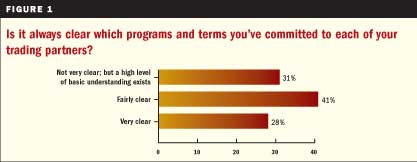Don Lanham of Clarkston Consulting on Flawless Retail Execution
Two factors make flawless retail execution of trade promotion marketing programs more critical than ever before. First, trade promotion budgets for consumer products manufacturers are huge (No. 2 line item overall behind cost of goods sold). These trade spending budgets will continue to grow and will outpace the rates of revenue growth for most consumer products companies.
Second, connecting with consumers is becoming more complicated and costly as consumers are harder to reach outside the confines of retail stores. Consumers have a wide range of shopping behaviors, and most notably, are shopping in multiple channels. Consumers are being bombarded with information and choices through a wide variety of media and are growing increasingly numb toward mass advertising thus minimizing mass advertising's affect in driving consumer purchases at retail. Consumers are stressed for time, making many of their purchase decisions in the store at the point of purchase.
So, due to the billions of dollars spent each year in trade marketing programs and the current consumer dynamics/behaviors that drive purchase in-store decisions, the importance of retail execution and monitoring of trade promotion marketing programs and in-store merchandising is more critical than ever before for consumer products manufacturers and retailers.
Simply put, retail execution and monitoring is the communication of store-level event details to the proper parties, the execution of planned trade promotion events in accordance with agreed upon program details, and the capturing/collection/confirmation of retail performance activities -- merchandising, feature ads, price reductions, new item placements, plano- gram implementation/integrity and the like. If it is not already, retail execution and monitoring must be a priority for all involved with the considerable use of resources, extensive planning and development that has gone into the trade marketing event(s); the amount of money that is being spent on the particular trade program(s); and the potential impact these trade marketing programs and events will have on the consumer products manufacturer, the retailer, the consumer and the brand.
Accurate communication by the consumer products manufacturers to their sales force of the agreed upon program details is critical to solid trade program execution at retail. Most importantly, the two parties -- the consumer products manufacturer and the retailer -- should make an agreement (a contract, if you will) and agree to all the specifics of each trade marketing program and make certain that everything is clear as to the execution responsibilities of each party. It is surprising that a majority of consumer products manufacturers do not adhere to this basic business practice.
In a recent CGT/Clarkston Consulting trade promotion management survey, consumer products manufacturers were asked if it is always clear which programs and terms are committed to trading partners, and only 28 percent stated that it was "very clear." The remaining 72 percent stated that programs and terms were "not very clear" or only "fairly clear" (see Figure 1).

To improve, consumer products manufacturers' sales and account management teams should confirm in writing with the retailer the agreed upon terms of each trade promotion program/event. This document can also be used throughout the settlement process to reduce errors, to eliminate confusion/ mistrust, and to improve the consumer products manufacturer/retailer relationship. A consistent communication method/process should also be in place to informthe proper parties of store level event details and the agreed upon execution plans in a timely and accurate manner. When consumer products manufacturers communicate to their field sales force, it would be extremely helpful for the account managers to obtain the retailer's internal communique to their stores detailing in-store execution plans. This helps to completely close the communication loop and puts all parties on the same page.
Once the program execution begins, a combination of people, process and technology will make flawless retail execution a reality. Field sales personnel must be equipped with training, tools and abilities to work with the retail partners within their assigned territories to carry out the promotion plan based on current goals, objectives and priorities. Regular management evaluation of these "feet on the street" is essential to creating a sales team that executes promotions and events successfully. A retail account call plan/reporting process should be implemented to report the promotional activities to include new item authorizations, shelf inventory levels, product pricing, feature ad activity, display placement/inventory, product ordering, product survey distribution/signoff, competitive activity and other assigned tasks. Communication continues to be of prime importance and electronic tools can be used to ensure reporting accuracy, speed updates, disseminate new information and enhance communication efficiency. The use of two-way electronic communication and immediate electronic reporting of trade promotion activities are used by the best in class. Field sales personnel and brokers can electronically capture/collect/report retail performance activities and those promotion elements previously agreed to by the retailer. Finally, when execution issues arise, an issue-escalation process should be in place for the communication of problems with the retail execution elements of a trade promotion/ program. Issues should be addressed immediately and resolved by the next workday.
To truly optimize trade spending, there are several steps that should be completed before and after retail execution (planning, budgeting, promotion modeling, and then settlement, post-program analysis and category insight). Some of these steps require investment in new technology or skills to guarantee success, however, flawless retail execution and monitoring is an area where consumer products manufacturers and retailers can show immediate improvement with little/no investment by focusing on people, process and communication. Solid execution is also dependent on the relationship between consumer products manufacturers and their retailers. In the last five years, retailers have become highly interested in trade marketing program collaboration, having their trade promotion management projects in conjunction with consumer products manufacturers to fully leverage the billions of dollars being spent each year to drive desired consumer behavior in retail stores. CG
